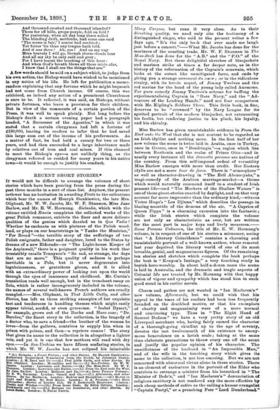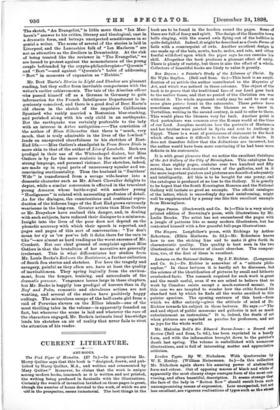RECENT SHORT STORIES.*
IT would not be difficult to arrange the volumes of short stories which have been pouring from the press during the past three months in a sort of class list. Anyhow, the present reviewer has no hesitation in awarding Firsts to the collections which bear the names of Henryk Sienkiewicz, the late Mrs. Oliphant, Mr. W. W. Jacobs, Mr. W. F. Shannon, Miss Jane Barlow, and Mr. E. W. Hornung. Sielanka, which with the volume entitled Hania completes the collected works of the great Polish romancer, exhibits the finer and more delicate qualities of the genius which dazzled us in Quo Vadis? Whether he enchants us with pictures of the Polish wood- land, or plays on our heartstrings in " Yanko the Musician," "For Bread "—the terrible story of the sufferings of two Polish emigrants, father and daughter, lured to the States by dreams of a new Eldorado—or "The Light-house Keeper of the Aspinwall," there is a poignant quality in his work that irresistibly recalls Tennyson's "So sad, so strange, the days that are no more." This quality of sadness is perhaps inevitable in a Pole, but it never degenerates into lugubriousness, or gratuitous gloom, and it is allied with an extraordinary power of looking out upon the world through the eyes of innocence and childhood. Mr. Curtin's translation reads well enough, but in the trenchant essay on Zola, which is rather incongruously included in the volume, the names of several well-known French authors are cruelly mangled.—Mrs. Oliphant, in That Little Cutty, and other Stories, has left us three striking examples of her exquisite tact and tenderness in handling themes which might easily appear trivial, sordid, or even gruesome. "Isabel Dysart," for example, grows out of the Burke and Hare case; "Dr. Barrere," the finest story in the collection, is the tragedy of a doctor who, to save a friend—the brother of the woman he loves—from the gallows, contrives to supply him when in prison with poison, and then—a reprieve comes ! The story that gives its name to the collection is in altogether a lighter vein, and yet it is one that few mothers will read -with dry eyes.—In Sea-Urchins we have fifteen seafaring stories, in which Mr. W. W. Jacobs has not eclipsed his inimitable • (L) Sietania a Forest Picture ; and other Stories. By Henryk Siemkiewicz. Authorised Unabridged Trawls:len from the Polish, by Jeremiah Curtin. London: J. M. Dent and Co —(2.) That Littie Cuttp, and other Stories. By Mrs. Oliphant. London: 314cmi1lan and Co.—(3.) Sea-Urchins. By W. W. Jacobs. London : Lawrence and BuLieo.—(4.) The Mess-Deck. By W. F. ...Shannon. London: Lawrence and Bnilen.-15.) Front the East unto the West. Jane Barlow. London: Methuen and Co.--(6.1 Some Persons Unknown. 13,,y R. W. Hornung. London: Cassell and Co.—(7.) Afterwards, and other ot.orisa By Ian Maclaren. London: Hodder and Stoughton.—(8.) Steries in Inoht Enid Shadow. By Bret Harte. London : C. A. Pe.irson.—(9.) Slum Sdhouettes : Stories of London Life. By J. Dodsworth BraY8Ww. London ; _OW:to and Windus.—(10..) From Seven Dials. By Edith Ostiere. London : onakWorth and Co.—(1L) Redman the Boatsteerer. and other Stories. By Undo Backe. Louden: T. Fisher Onwin. ilrany Cargoes, but runs it very close. As to their diverting quality, we need only cite the testimony of a distinguished singer, who said to the present writer a few days ago, "It's the only book that ever made me laugh just before a concert."—What Mr. Jacobs has done for the mariners of the coasting trade, Mr. W. F. Shannon in The Mess-Deck has done for the " A.B." and the "P.O." of the Royal Navy. Bat these delightful sketches of bluejackets and marines strike at times a far deeper note, as in the history of the reformation of the Captain's ooxswain, which looks at the outset like unmitigated farce, and ends by giving you a strange serrement du cosur ; or in the ridiculous rivalry, with its heroic sequel, of Jimmy Twelves and the red marine for the hand of the young lady called Anemone. For pure comedy Jimmy Twelves's scheme for baffling the experimentalising Captain in "Bare Navy," and the "Ad- venture of the Leading Hands," need not fear comparison with Mr. Kipling's Soldiers Three. This little book, in fine, deserves to be " crowned " by the Navy League for it spirited portrait of the modern bluejacket, not extenuating his faults, but rendering justice to his pluck, his loyalty, and his chivalry.
Miss Barlow has given unmistakable evidence in From the East unto the West that she is not content to be regarded aa an Irish idyllist and nothing more. In the first half of her new volume the scene is twice laid in Arabia, once in Turkey, once in Greece, once in " Dendringia "—a region which lies between Ruritania and the realm of Prince Otto—and in nearly every instance all the dramatis personw are natives of the country. From this self-imposed ordeal of versatility Miss Barlow emerges with more than credit. Her Eastern idylls are not a mere tour de force. There is "atmosphere" as well as character-drawing in "The Evil Abenooya,hs," a tragi-comedy of the Arabian marriage-market—a theme which would naturally commend itself to a student of Irish peasant life—and "The Mockers of the Shallow Waters" is one of those ghost-stories enacted by daylight, and on that very account far more impressive than the ordinary kind,—witness Victor Hugo's "Lea Djinns," which describes the passage in blazing noontide of the demons of the air. "A Caprice of Queen Pippa " is a charming excursion into the fantastic ; while the Irish stories which complete the volume are not only as characteristic as ever, but are written for the most part in major keys and lively measures.— Some Persons Unknown, the title of Mr. E. W. Hornung's volume, is in respect of one of his stories a misnomer, seeing- that "A Literary Coincidence" contains a charming and unmistakable portrait of a well-known author, whose removal last year deprived the literary world of one of its most loveable, genial, and magnanimous figures. Of the remaining ten stories and sketches which complete the book perhapa the best is " Keiayon's Innings," a very touching study in boyish hero-worship. In about half-a-dozen cases the scene is laid in Australia, and the dramatic and tragic aspects of Colonial life are treated by Mr. Hornung with that happy union of vigour and sympathy which has stood him in such good stead in his earlier novels.
Charm and pathos are not wanted in "Ian Maclaren's new volume, Afterwards, but we could wish that his appeal to the tears of his readers had been less frequently founded on the deathbed motive, or that his exemplara of charity and magnanimity were of a more normal and convincing type. Thus in "The Right Hand of Samuel Dodson" we have a very pretty story of an old Liverpool merchant who, having fairly earned the character of a thorough-going skinflint up to the age of seventy, devotes the last twelvemonth of his existence to anony- mous benevolence on a lavish scale ; taking at the same time elaborate precautions to throw every one off the scent and justify the popular opinion of his character. The unselfishness of the husband in "An Impossible Man," and of the wife in the touching story which gives its name to the collection, is not less amazing. But we are no concerned with abnormal virtue alone in these stories. There is an element of caricature in the portrait of the Elder who contrives to estrange a minister from his betrothed in "The Minister of Bede's," and "Ian Maclaren's " denunciation of religious snobbery is not rendered any the more effective by such cheap methods of satire as the calling a hussar evangelist "Captain Footyl," or a preaching Peer "Lord Dunderhead."
The sketch, "An Evangelist," is little more than "Ian Mac- 'aren't'" answer to his critics, literary and theological, cast in a dramatic form, and betrays unexpected sensitiveness in so genial a writer. The scene of several of the stories is laid in Liverpool, and the Lancashire folk of "Ian Maclaren " are vot as attractive as the dwellers in Drumtochty. At the risk of being treated like the reviewer in "The Evangelist," we are bound to protest against the nomenclature of the young .couple befriended by the crypto-philanthropist—" Queenie " and "Bert "—and against " Queenie's " habit of addressing • " Bert" in moments of expansion as "Hubble."
Mr. Bret Harte's Stories in Light and Shadow are pleasant reading, but they suffer from inevitable comparisons with the
writer's earlier achievements. The tale of the Alsatian officer 'who passed himself off as a German in Germany to gain information for the French Intelligence Department is in- geniously conceived, and there is a good deal of Bret Harte's old charm in the sketch of the impulsive Californian Spaniard who rashly married a Bostonian blue-stocking, and perished along with his only child in an earthquake.
Bat the earthquake was certainly preferable to the lady
with an interest in Aztec antiquities.—The conviction of the author of Slum Silhouettes that there is "much. very
much, that is truly admirable in the lives of the lowliest"
lends an unexpected cheerfulness to his sketches of East- End life.—Miss Ostlere's standpoint in From Seven Dials is more akin to that of the author of Lira of Lambeth. Both are
prodigal in their use of the Whitechapel dialect, but Miss -Ostlere is by far the more realistic in the matter of oaths, strong language, and personal violence. Her sketches, indeed, are made up in equal parts of unnecessary squalor and un- convincing sentimentality. Thus the husband in " Smithers' Wife" is transformed from a savage wife-beater into a -domestic character such as Mr. Albert Chevalier delights to depict, while a similar conversion is effected in the truculent young Amazon whose battle-royal with another young "Hooliganess" is related with nauseating profusion of detail. As for the dialogue, the conscientious and continual repro- -dilation of the hideous lingo of the East End grows extremely -wearisome in the long-ran. Greater artists than Miss Ostlere or Mr. Brayshaw have realised this danger, and, in dealing with such subjects, have reduced their dialogue to a minimum.
Insight into the lives of the poor does not depend on the phonetic accuracy with which their speech is reported, and pages and pages of this sort of conversation : " Yer don't mean ter s'y as 'ow yew've left it dahu there fer the cats to tike "—are almost as hard reading as the worst excesses of Mr. Crockett. Bat our chief ground of complaint against Miss -Ostlere is that the brutalities of her narrative are generally
irrelevant. This is what differentiates her studies from Mr. Louis Becke's Rodman the Boalsteerer, a further collection
of South Sea stories and sketches. For here the tragedy and -savagery, painful as they often are, have at least the quality of inevitableness. They spring logically from the environ-
ment, from the temper, training, and antecedents of the dramatis personm. Vengeance looms large in these chapters, but Mr. Becke is happily less prodigal of horrors than in By Reef and Palm, romantic and chivalrous actions are not wanting, and several of the stories have positively happy
endings. The miraculous escape of the half-caste girl from a raid of Peruvian slavers on the Ellice islands—one of the most thrilling tales in the volume—is apparently founded on fact, but wherever the scene is laid and whatever the race of the characters engaged, Mr. Becke's intimate local knowledge lends his sketches an air of reality that never fails to rivet the attention of his reader.







































 Previous page
Previous page